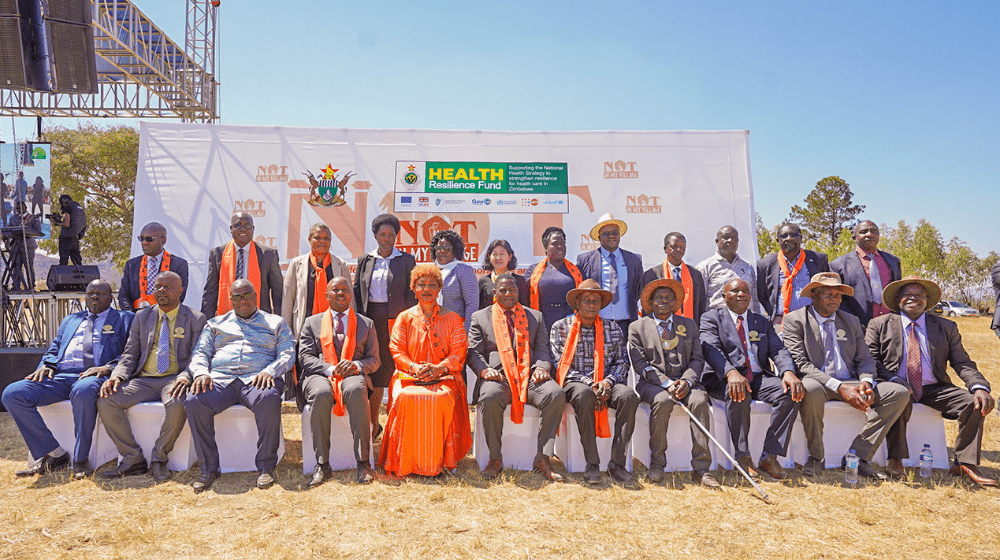HARARE, Zimbabwe, 26 August, 2024 – The Government of Zimbabwe, the United Nations Population Fund (UNFPA) and partners today commemorated World Population Day with launch of the “Not-In-My-Village” Campaign to end teenage pregnancies amid a growing concern of many young girls falling pregnant.
World Population Day (WPD) is commemorated each year and seeks to focus attention on the urgency of population and development issues. This year’s theme: “Embracing the power of inclusive data towards a resilient and equitable future for all” reminds us of the importance of data to tackle various development issues.
The launch of the “Not-In-My-Village” campaign comes against disturbing data from the National Assessment on Adolescent Pregnancies in Zimbabwe (June 2023) conducted by the Centre for Sexual Health and HIV/AIDS Research Zimbabwe under the leadership of the Ministry of Public Service, Labour and Social Welfare with technical and financial support from UNESCO, UNFPA and UNICEF.
A key finding of the Assessment is that 21% of antenatal care bookings were among adolescents aged 10-19 years, translating to 358,458 pregnant adolescents from an estimated 1,706,946 bookings made in 1,560 health care facilities between 2019 and 2022. The study also shows that 1,532 maternal deaths were recorded over the same period, with around 25% of them being among adolescent and young women under 24 years.
It was also established that the national prevalence rate of teenage pregnancy had increased to 22% from 9% in 2016 when compared to the findings from the National Fertility Study. Evidence is showing that COVID-19 had a huge impact in driving the burden upwards.To address this challenge, the Government of Zimbabwe, with the support of UNFPA, has launched the “Not-In-My-Village” campaign. Led by adolescents and young people themselves, through the Young People’s Network on Sexual and Reproductive Health, HIV and AIDS, working with the National AIDS Council and spearheaded by Chiefs in their respective communities, the campaign seeks to mobilize joint community efforts to tackle adolescent teenage pregnancies.
In a keynote address delivered on his behalf by the Minister of Health and Child Care Hon. Dr. Douglas Mombeshora, the President of the Republic of Zimbabwe, His Excellency, Cde. Dr. E.D. Mnangagwa said:
“As we look ahead, it is clear that to address teenage pregnancies and all population related issues while ensuring no one and no place is left behind we require sustained partnerships and collaboration. We must work together—government, civil society, development partners, traditional leaders, and communities—to create an environment where every young person can thrive, free from violence, with access to quality education, healthcare, and the opportunities
they need to realize their full potential.”
Through programmes such as the Health Resilience Fund (HRF) supported by the Governments of Britain, Ireland and the European Union; the Safeguard Young People (SYP) Programme supported by the Government of Netherlands and Switzerland and the 2Gether4SRHR funded by the Government of Sweden a number of interventions targeted at ending adolescent pregnancy are already ongoing.
“The United Nations is firmly committed to working with your Government to address this population issue and we already have various programmes and projects that we are implementing. Through these programmes critical investments to improve the education, health and wellbeing of young people including young girls are being made that will contribute to preventing teenage pregnancy and ensuring girls reach their full potential,” stressed Mr Edward Kallon, the United Nations and Humanitarian Coordinator.
Speaking at the event, Ms Miranda Tabifor, UNFPA Representative underscored the criticality of data to inform policy and programming.
“Data is important for decision makers as it helps shape policies, direct actions and advise on development options in a way that reflects the needs of everyone. Evidence-based actions are needed to address teenage pregnancies," she added.
Various development partners attending the commemorations and launch including theGovernment of Ireland representing the Health Resilience Fund funding partners, the Government of Britain and the European Union), the Governments of Sweden and Australia also expressed support to efforts to ensure young people, especially girls reach their full potential.
This year's commemorations were held at Nzvimbo High School in Mazowe District located Mashonaland Central Province - one of the provinces with high teenage pregnancy rates in Zimbabwe.
For more information, please contact the following:
Donald Mujiri, National Protocol and Public Relations Manager, Ministry of Health and Child Care on: Tel: +263 712 867 337 or Email: dmujiri@gmail.com
Sirak Gebrehiwot, UN Resident Coordinator’s Office Development Coordination Officer onTel:+263772198036 & Email: sirak.gebrehiwot@un.org
Bertha Shoko, Innovation, Communication & Visibility Specialist on Tel: +263 772 782299 orEmail: shoko@unfpa.org


